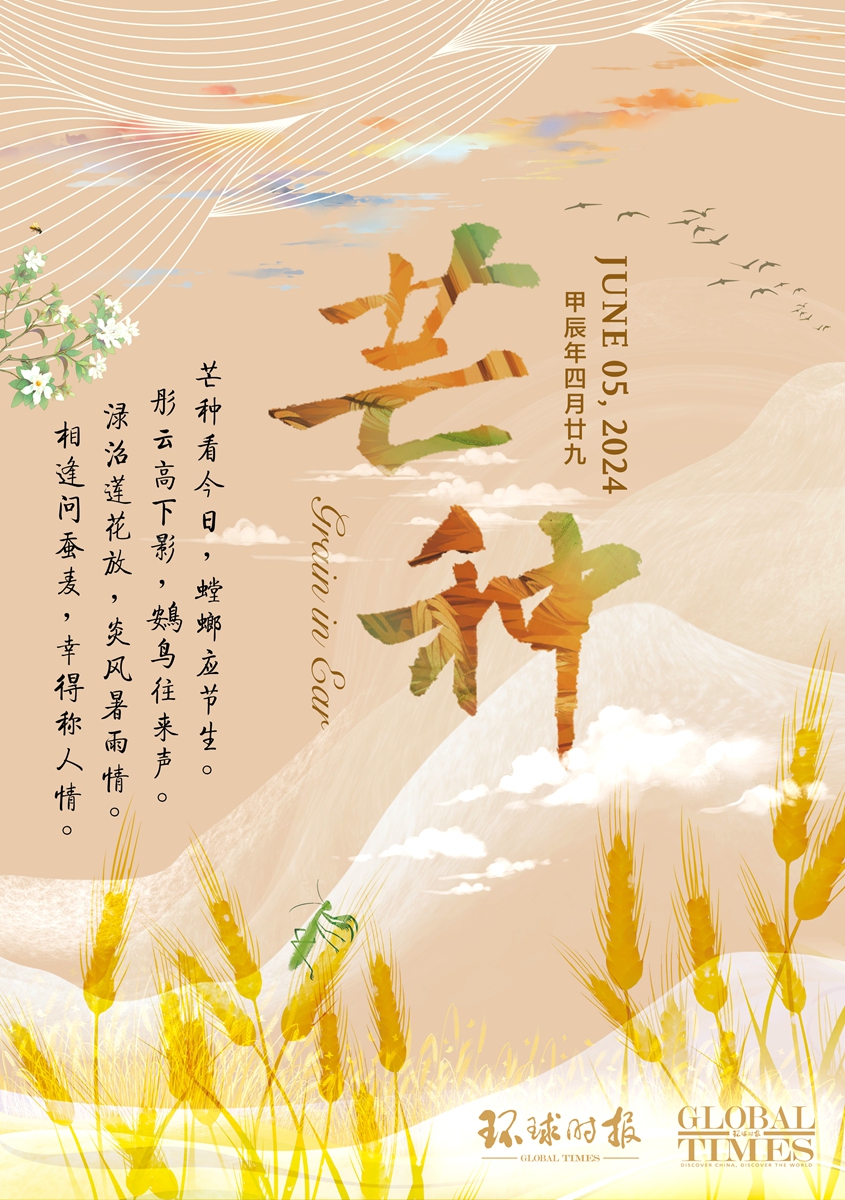ARTS / CULTURE & LEISURE
‘Mangzhong’ solar term: Farmers’ busiest mid-summer season

Mangzhong
Mangzhong, or Grain in Ear, falls on Wednesday this year. This is the ninth of the 24 solar terms and the third solar term of the summer according to the traditional Chinese calendar. It is the only solar term that directly references agricultural activities, while its pronunciation in Putonghua sounds the same as "busy planting."When the sun reaches the ecliptic longitude of 75 degrees, the solar term of mangzhong arrives. It also means the midsummer season begins.
Mang refers to the awn, or the thistle, on the seeds of grain plants. Word for word, mangzhong refers to thistle-bearing wheat that needs to be harvested quickly, while awn-bearing rice can be planted. That is why farmers are at their busiest during the 15-day mangzhong term.
As there will be more frequent rain, crops such as cotton and corn reach their peak demand for water and fertilizer, while farmers must also work hard to get rid of weeds and pests and prevent diseases.
During this time in mid-summer, gardenias are in full bloom and both plums and wheat are about ready for harvest.
The weather also changes during this season. Heavy rain is seen more frequently and temperatures are high as the air grows more humid. As this season is the typical time for plums to ripen, the weather is called the "plum rain season" in regions south of the Yangtze River that experience an extended monsoon season.
During mangzhong, extreme weather can include heavy rain, hail, strong winds and drought. The areas south of the Yangtze River, the Jianghuai area and the middle and lower reaches of the Yangtze River, enter the plum rain season one after another. This plum rain is forged as the intensity of cold air weakens and retreats northward, and warm air moves up north. After a period of confrontation between cold and warm air, warm air overcomes cold air, and the rainy season ends.
Ancient Chinese divided mangzhong into three pentads: the first sees the hatching of the eggs laid by mantis in late autumn, the second sees the appearance of shady-loving shrikes on the branches of trees. While in the third pentad, the mockingbirds stop singing.
To deal with the heat, people in South China have the folk custom of preparing plum wine. Plums ripen from May to June. Since the Three Kingdoms Period (220-280), stories of how people drank plum wine while telling heroic tales have been passed down in the classics. Freshly harvested plums taste sour and astringent. After cooking and processing, plums taste much better and agreeable.
Preparing plum wine is no simple task. In mid-summer, people soak fresh plums in rice wine or millet wine along with rock sugar. After being sealed for 30 days, the plum wine is ready. Such drinks are widely favored by not only the Chinese, but many other cuisine cultures in Asia. Although it uses similar techniques, fermented green plum wine is more difficult to prepare and therefore relatively rare.
South of the Yangtze River, people also have the custom of saving up rain during the plum rain season. In classical books, it says that rainwater was collected in large vats for boiling tea. If smaller containers such as bottles were selected, the rain water could be stored even longer.
"The first choice of water for serving tea is from sweet springs. The second is rainwater from plum rain, which tastes unique and sweet," reads the classic work Cha Jie, or Tea Solution.
Another important ancient sacrificial folk custom is to say farewell to the flower gods. During mangzhong, flowers stop blooming, so ancient Chinese would hold a ceremony to worship the flower gods, whose duties were coming to an end. Rituals were held to express gratitude to the flower gods and wish to meet them again in the coming year.
The custom is so important that it was featured in a chapter in the classic Chinese literature work A Dream of Red Mansions. In the book, on the first day of Mangzhong, girls make horses and sedans using silk or willow branches and flowers and tie them on every tree and every flower.
In hot and humid weather, people need to avoid heat and stay cool. During the daytime, carrying an umbrella and wearing a hat is advisable. People need to drink more water and beverages with a small amount of salt to replenish the salt in their bodies. Sufficient rest and sleep are also necessary to stay healthy.


